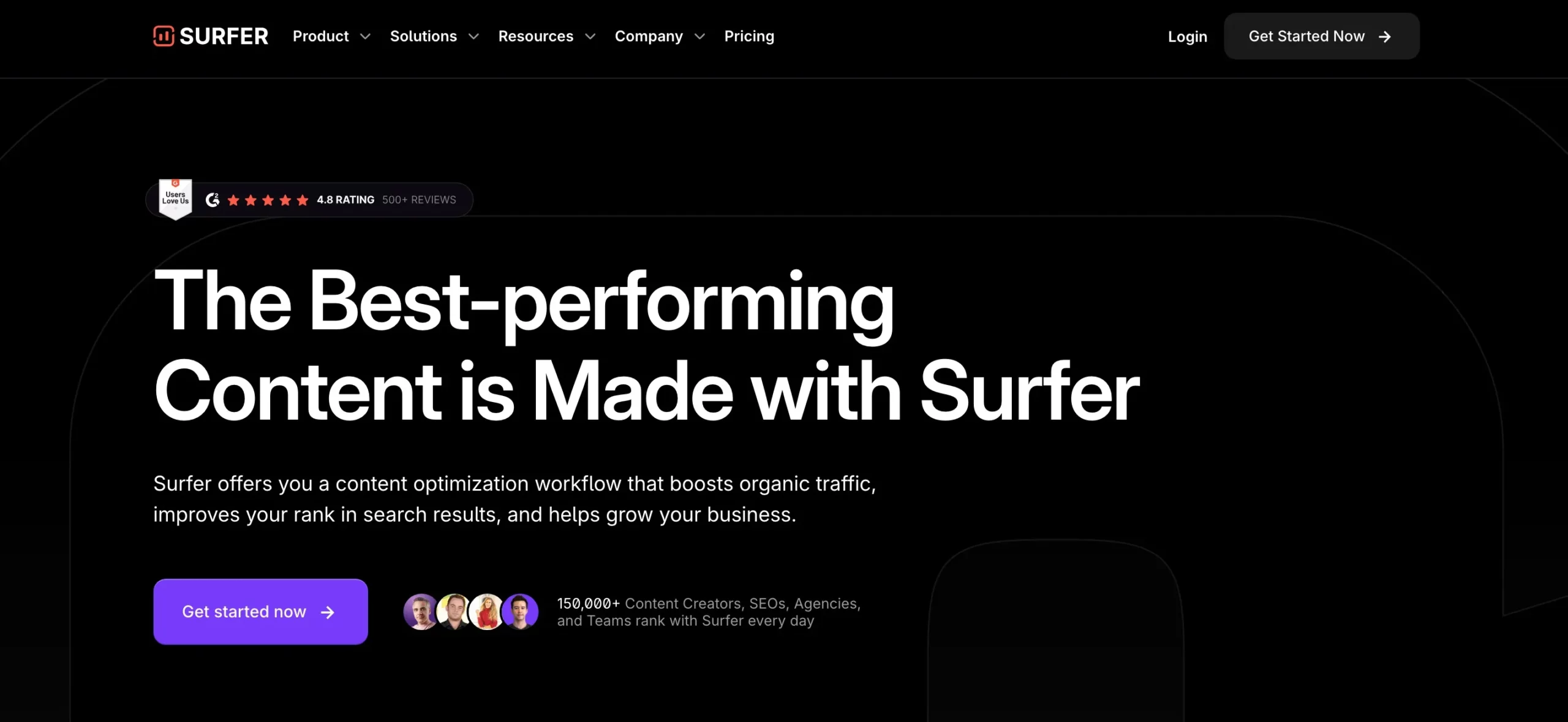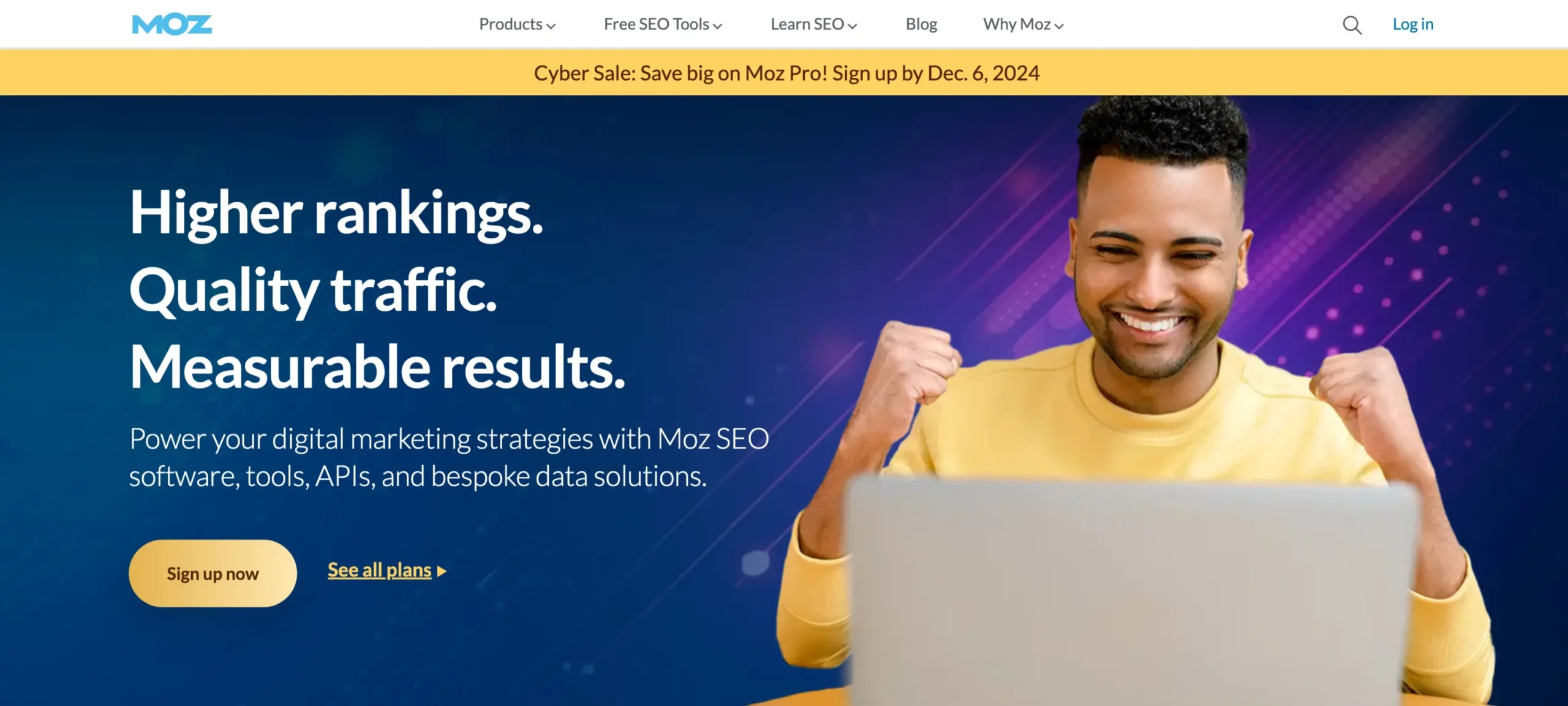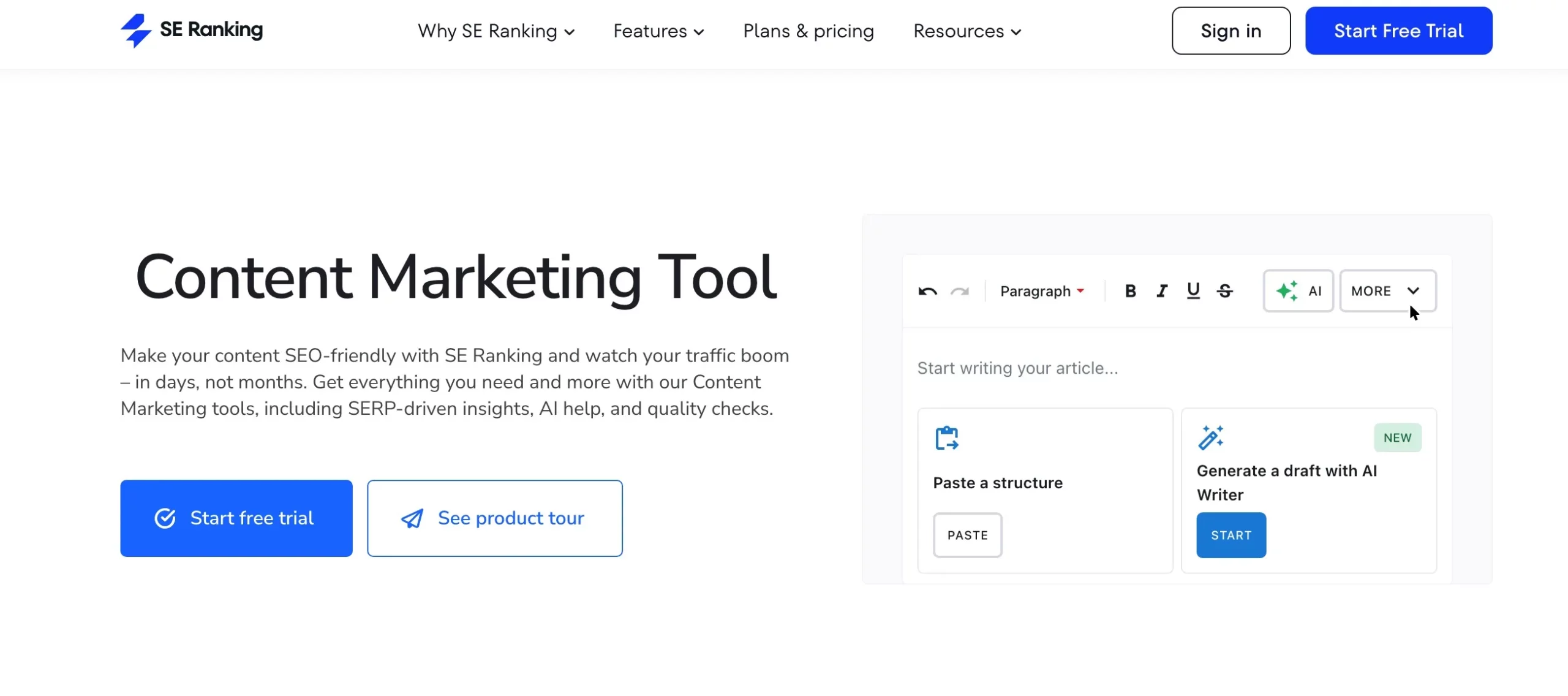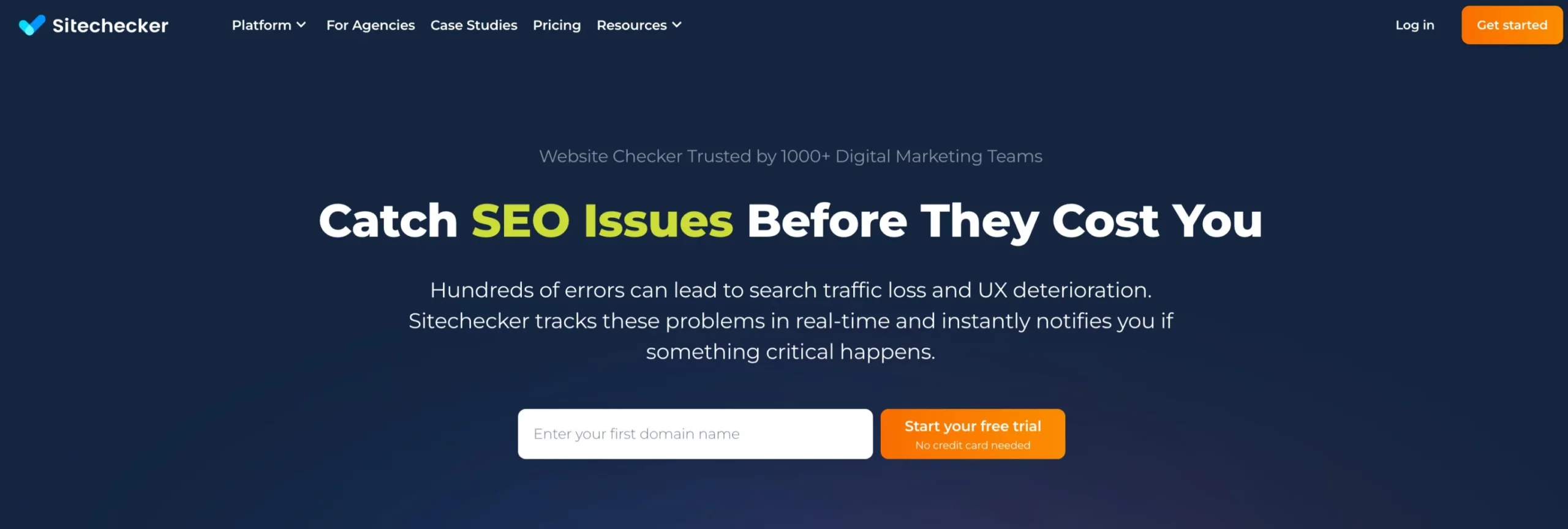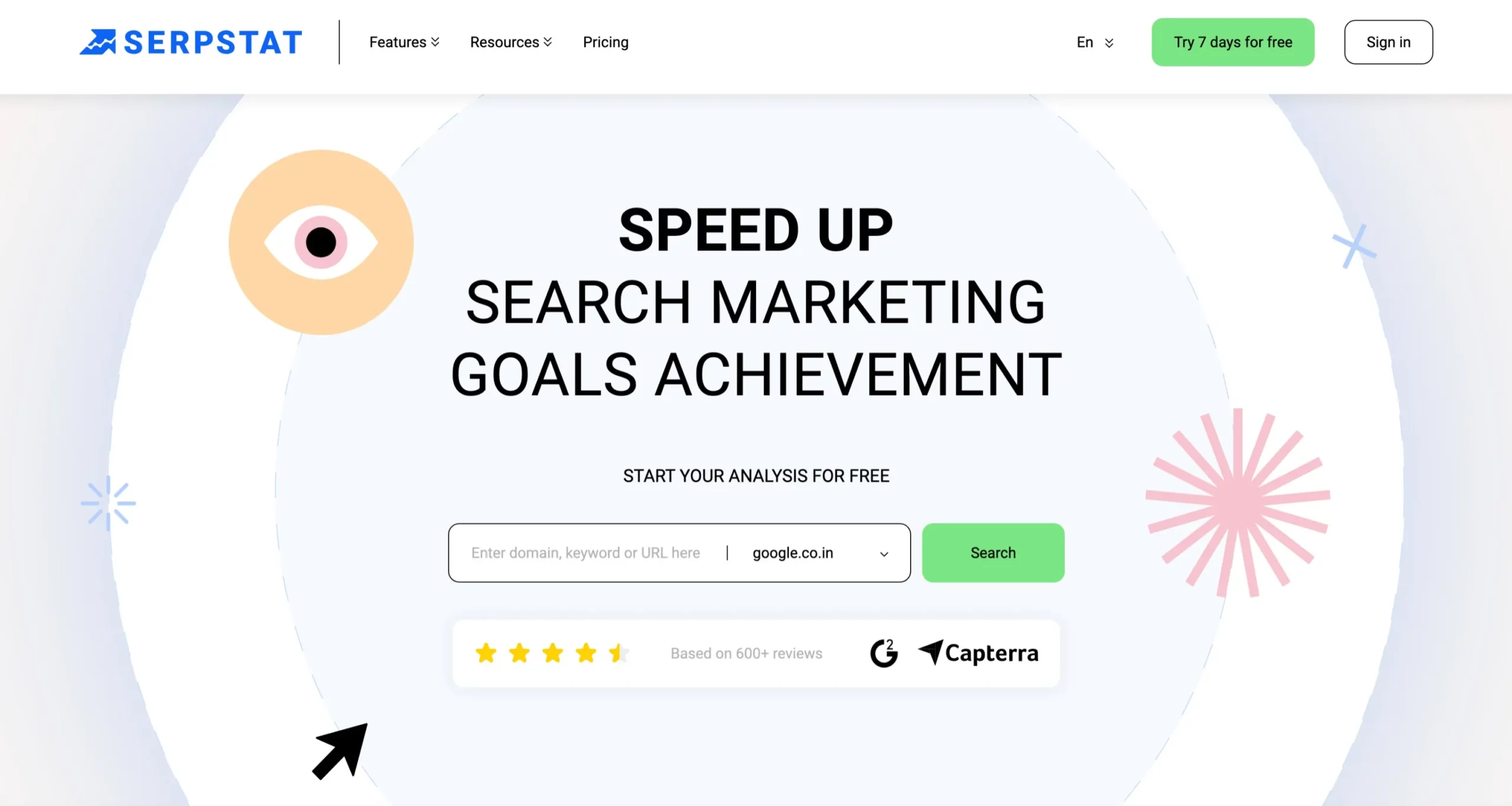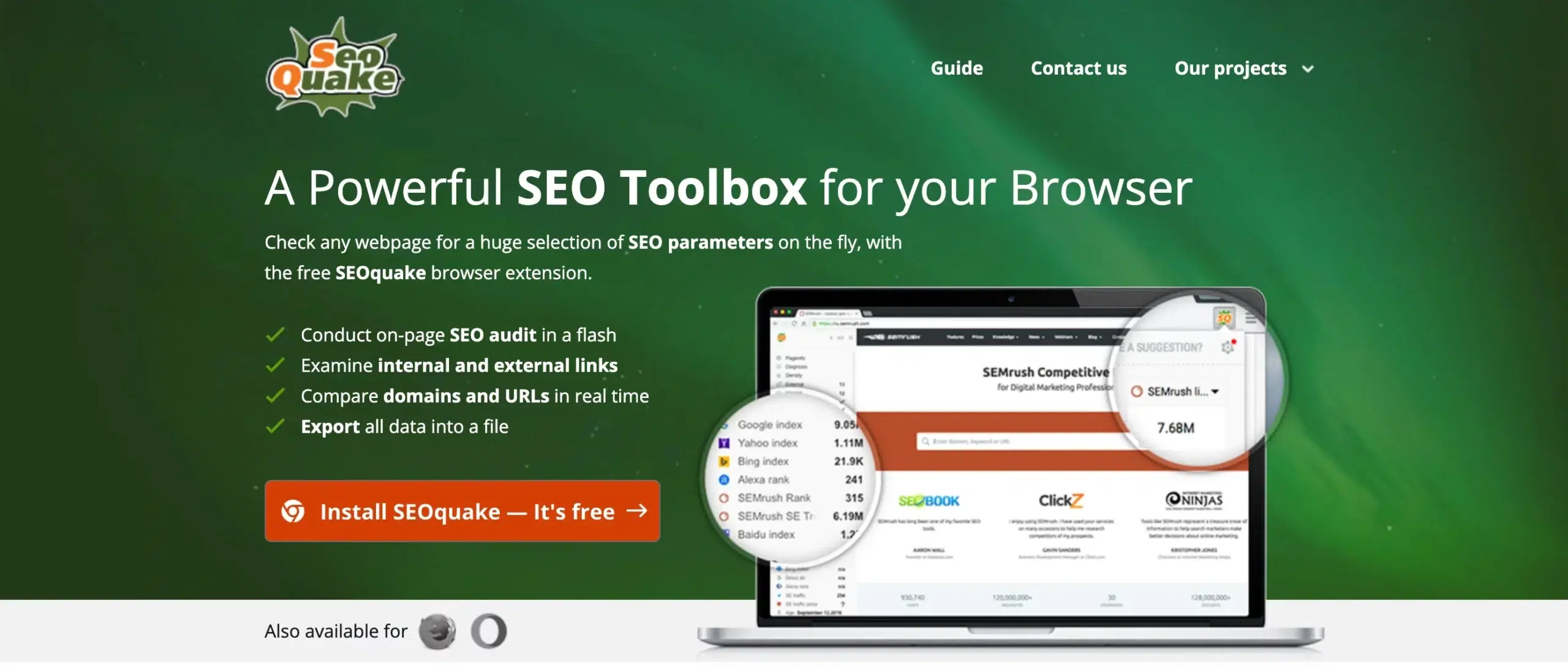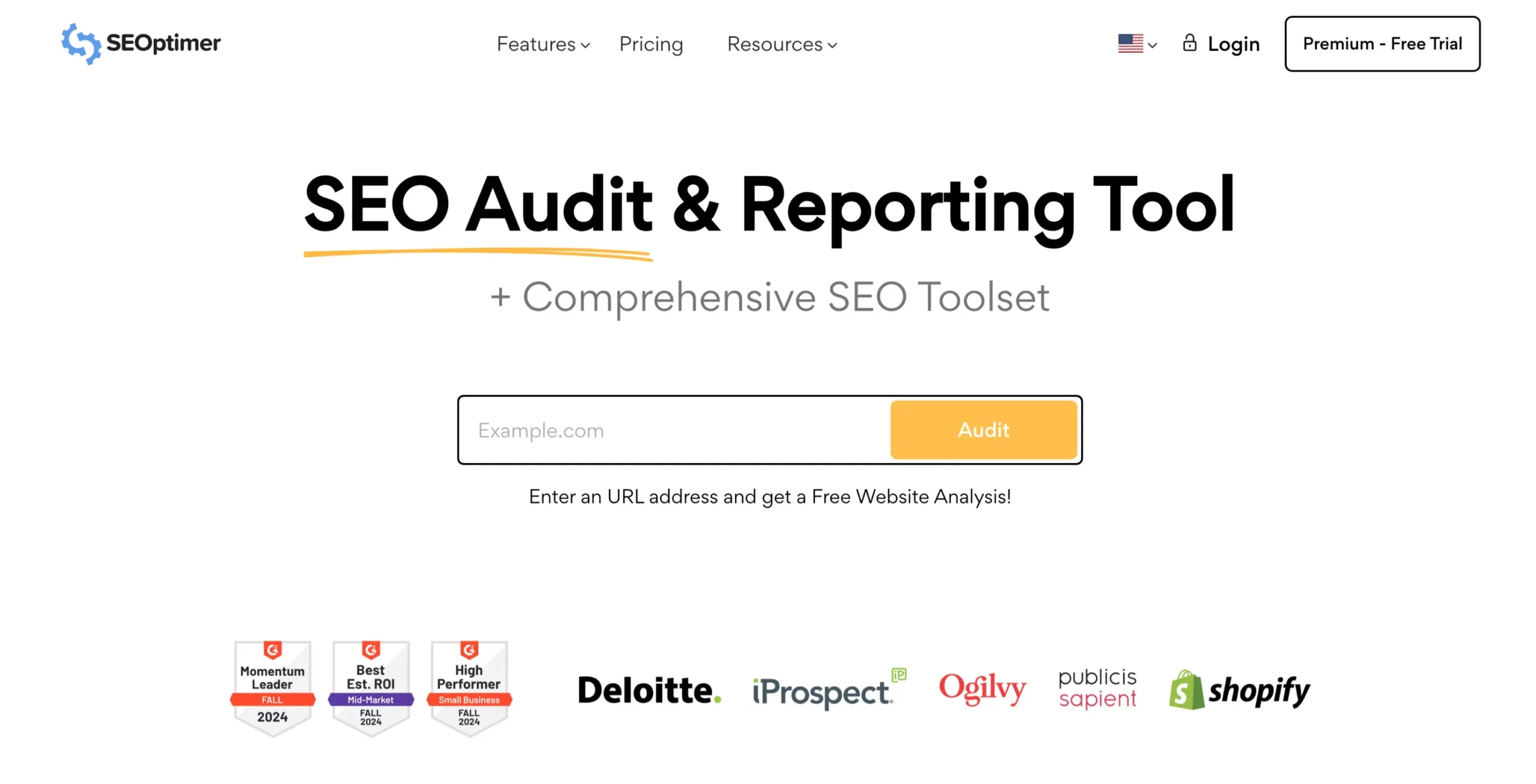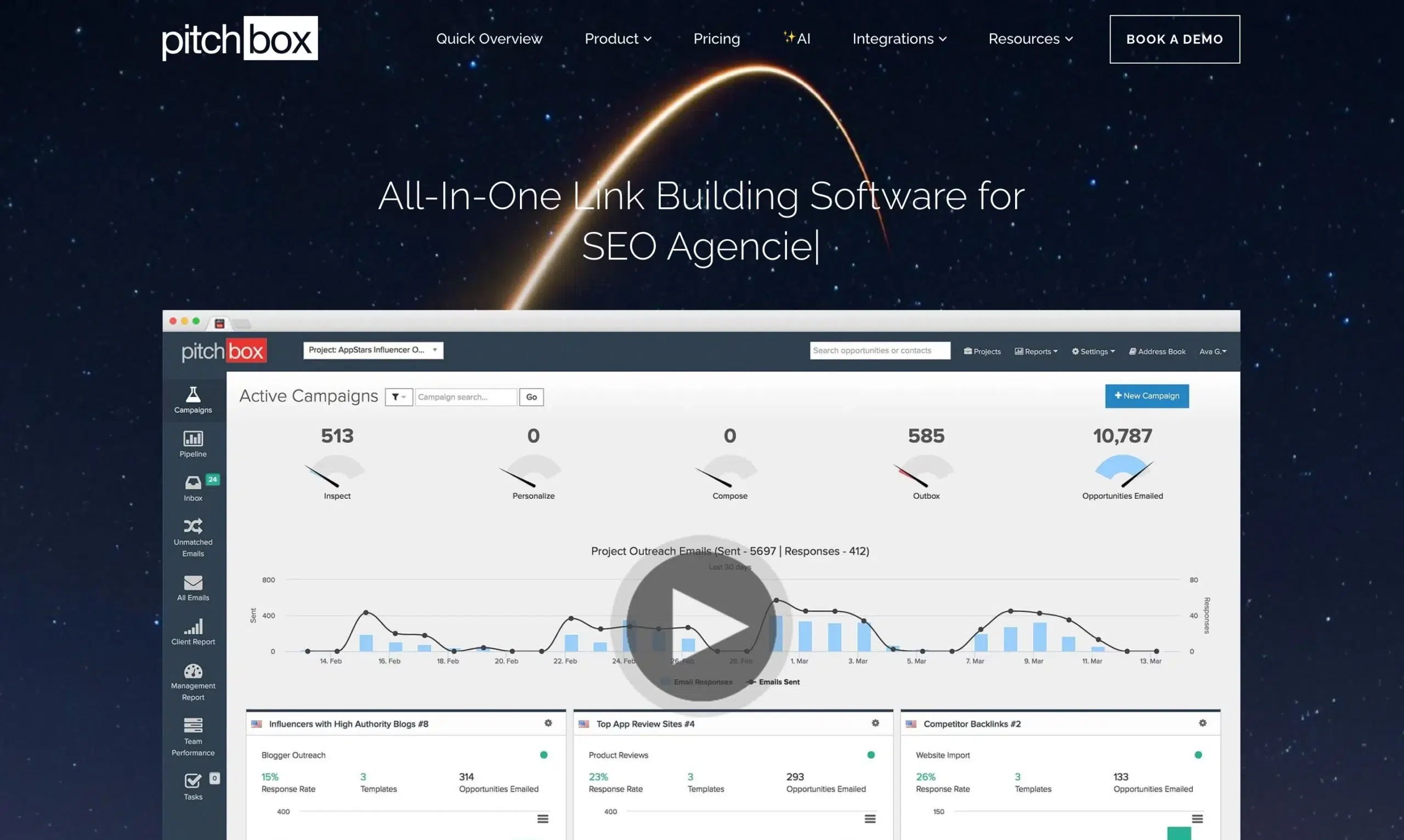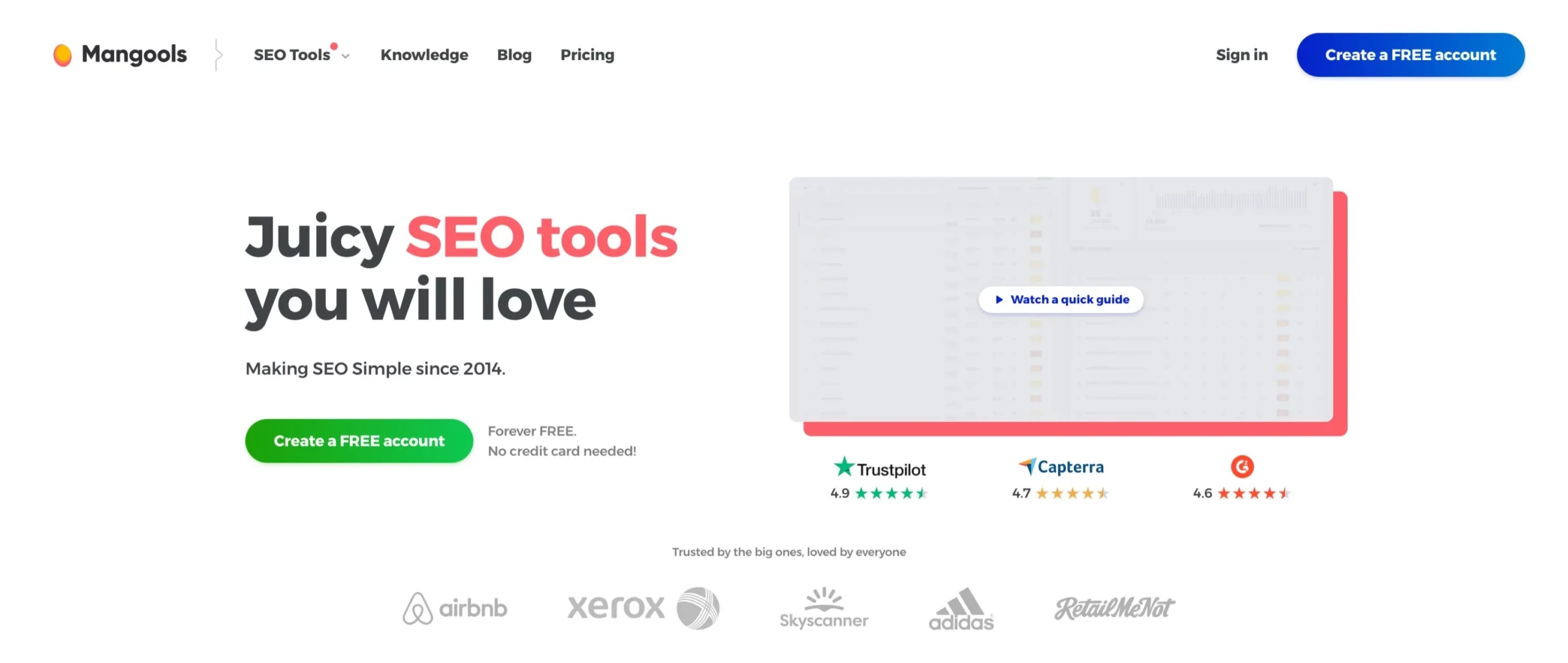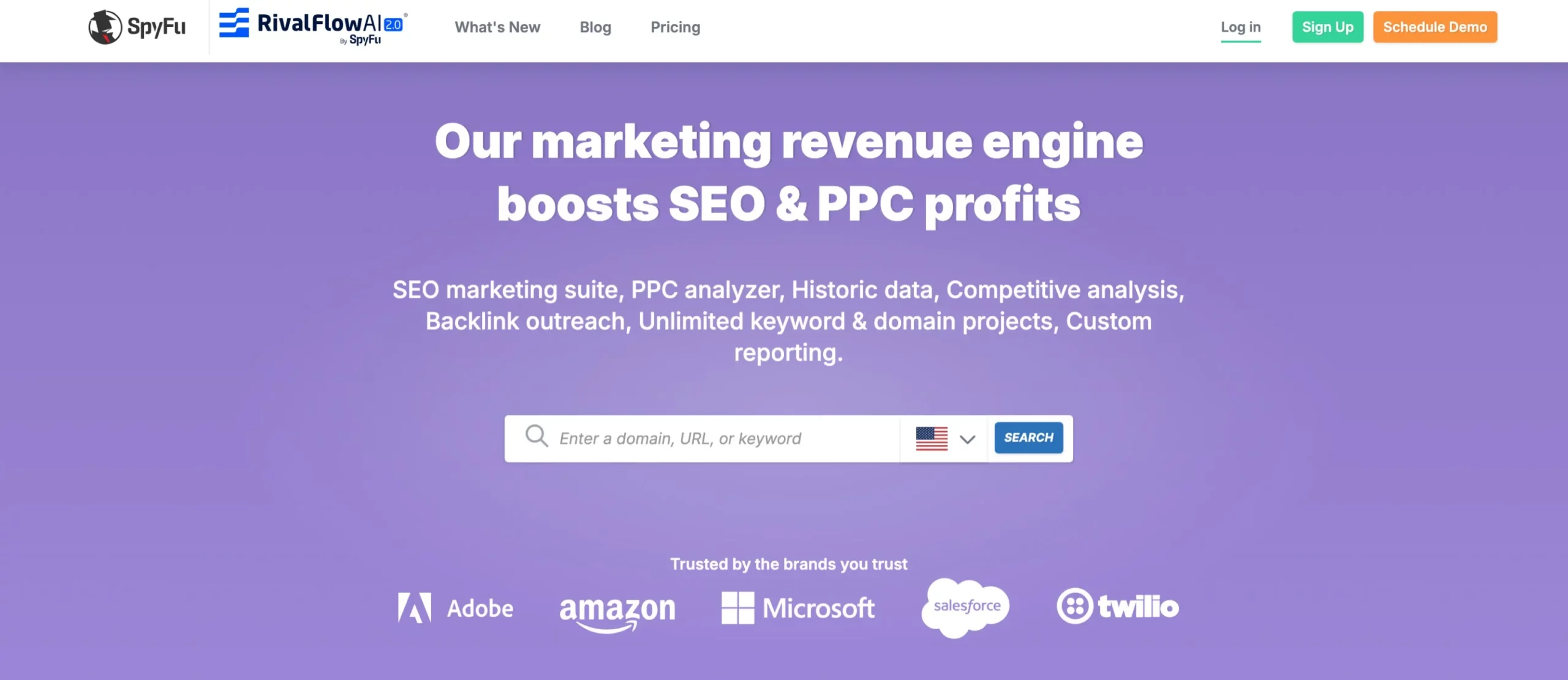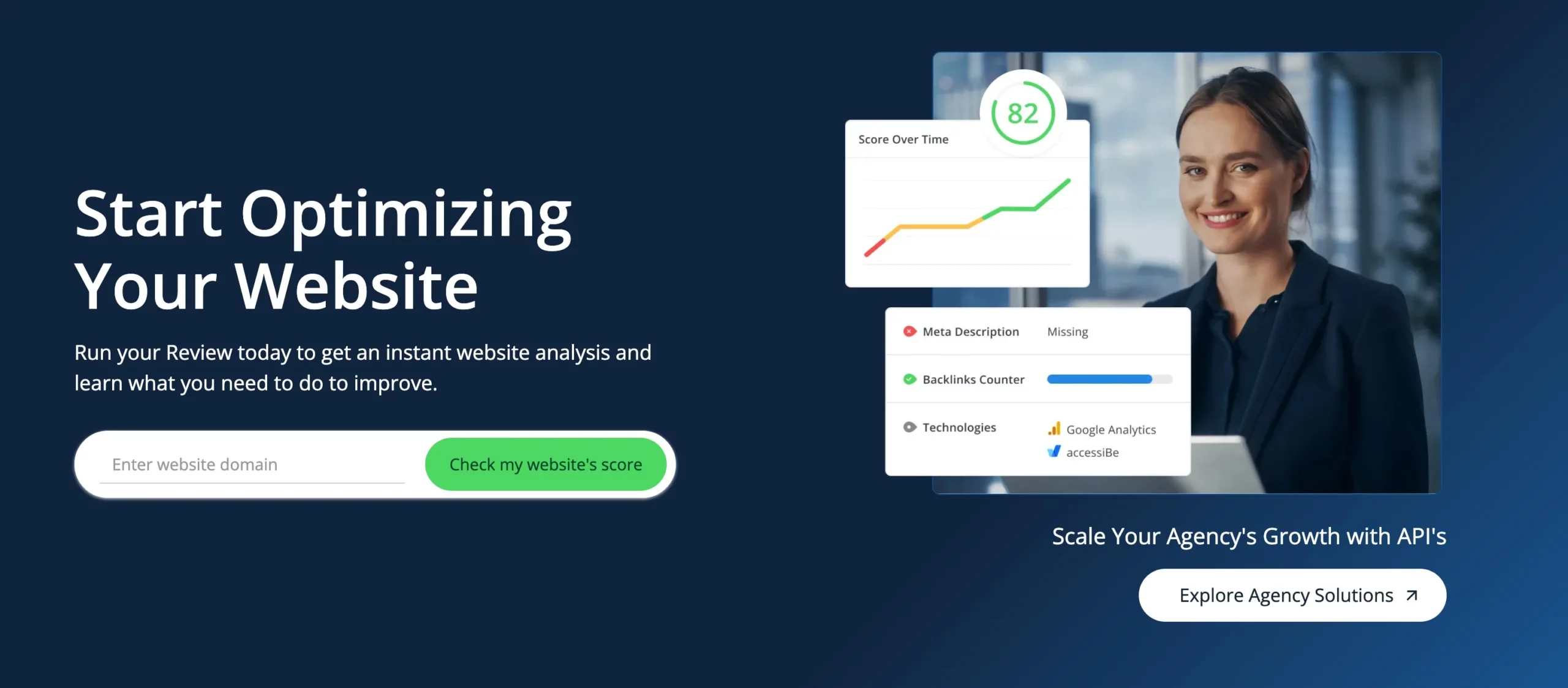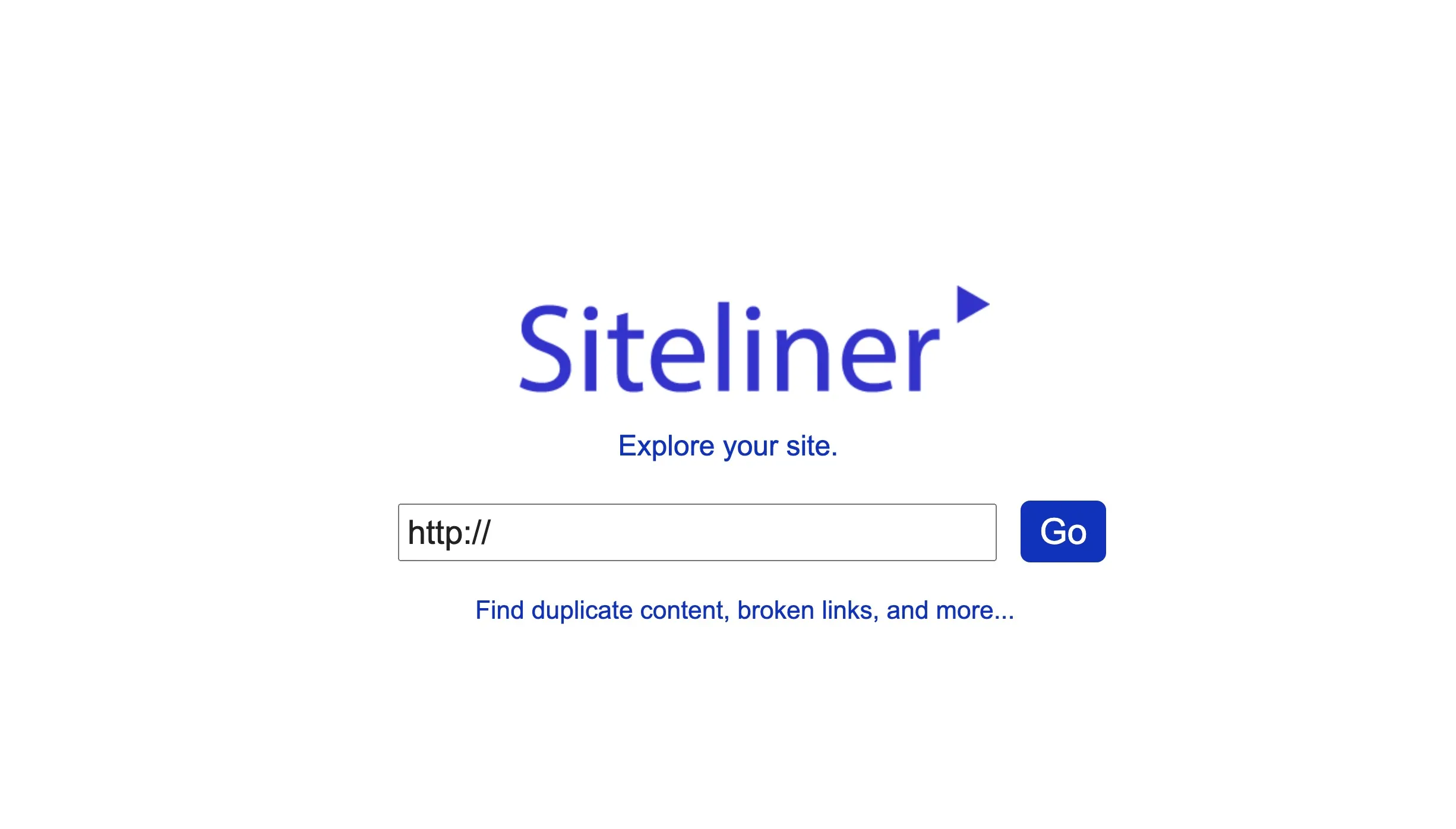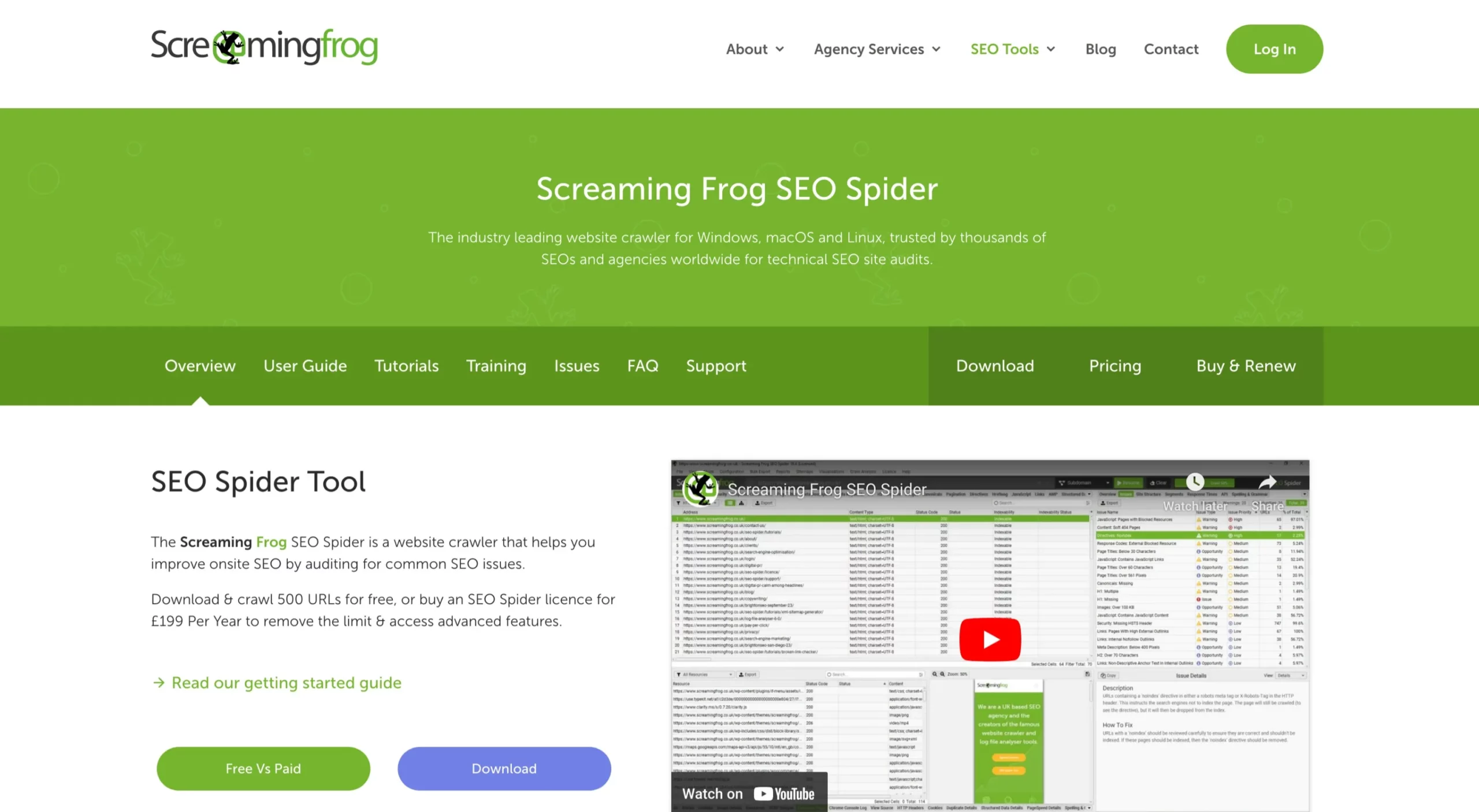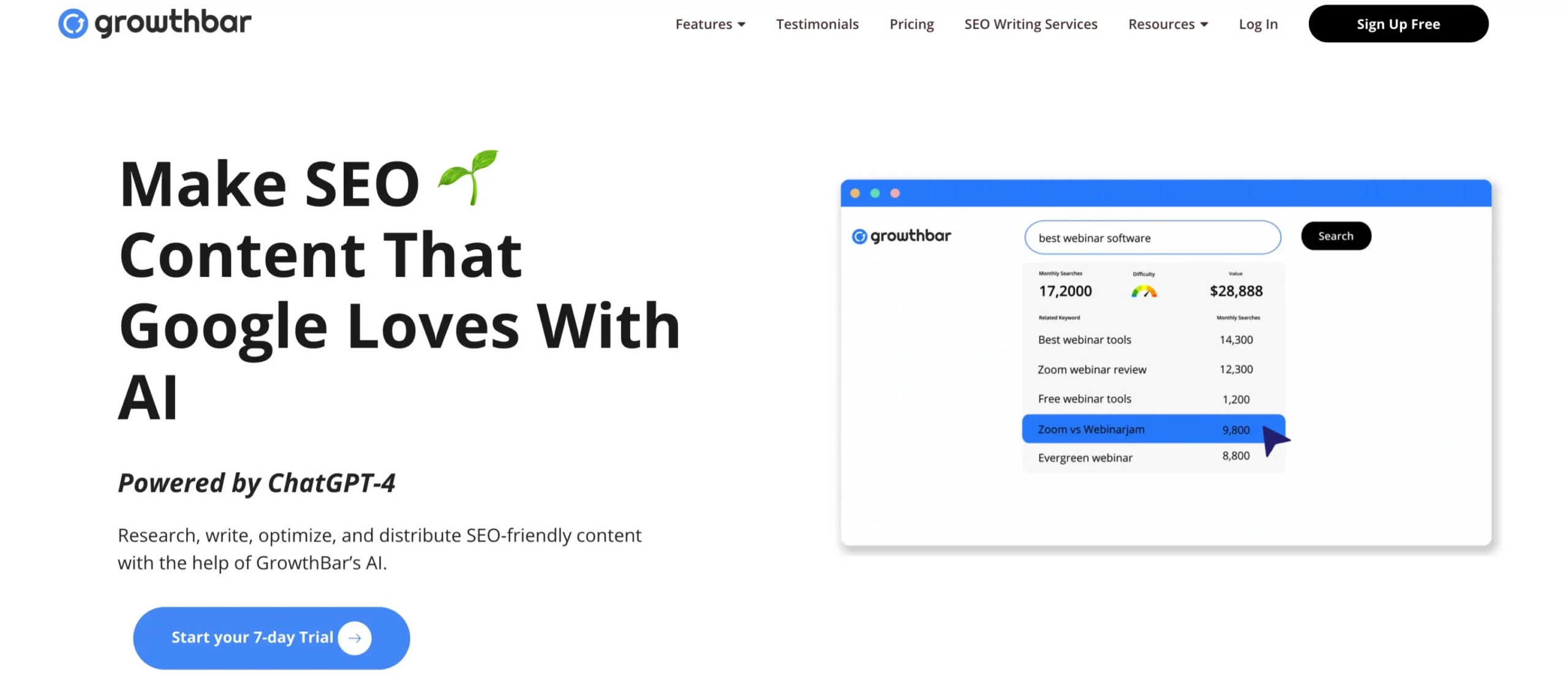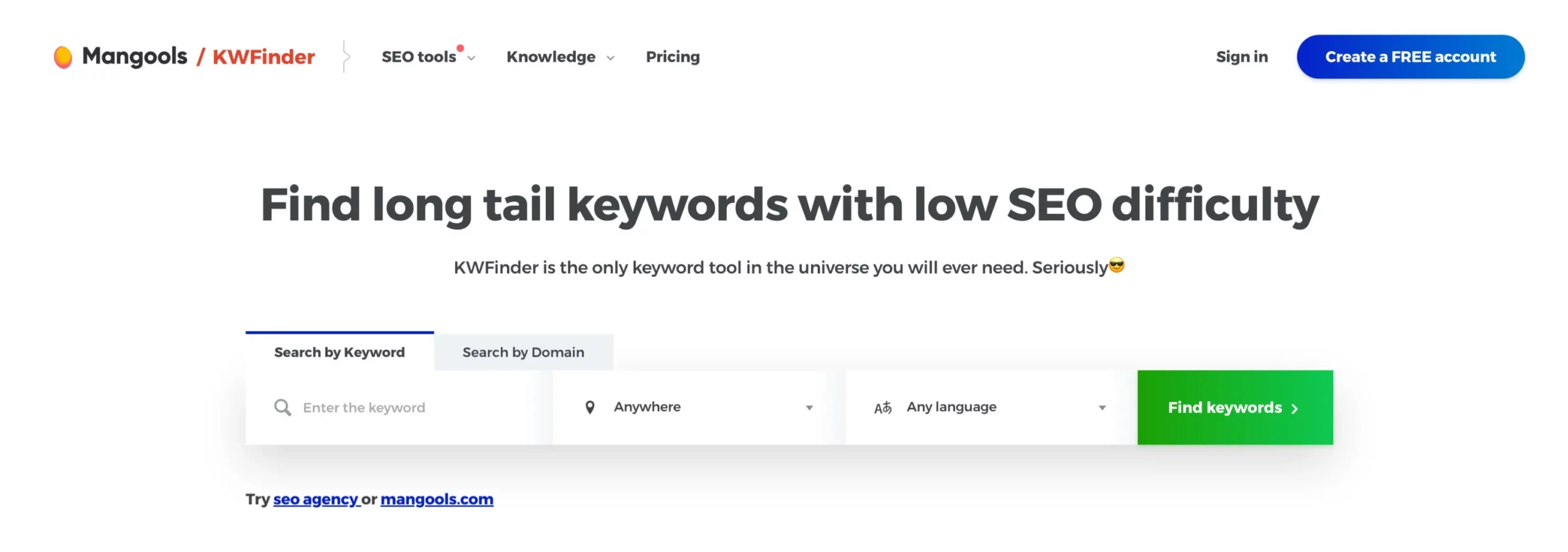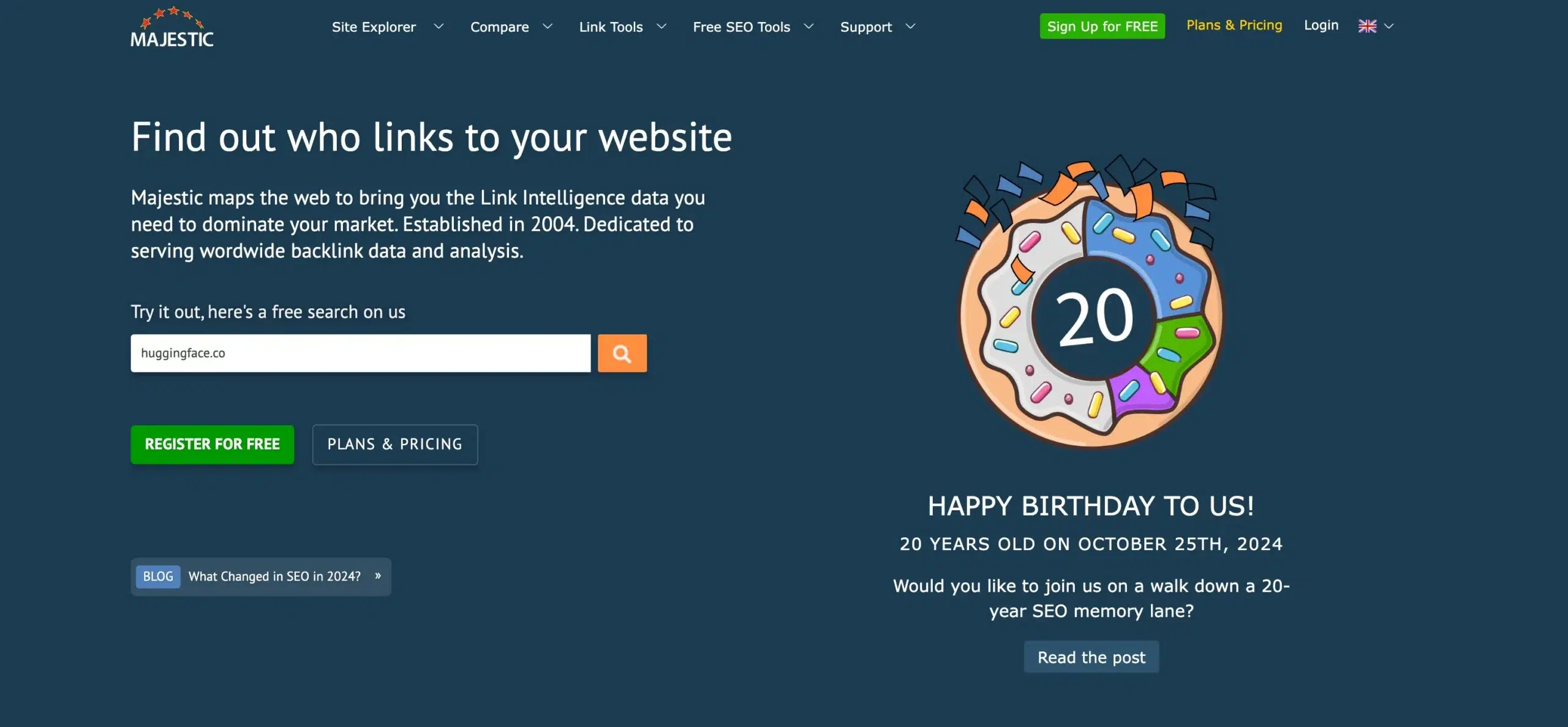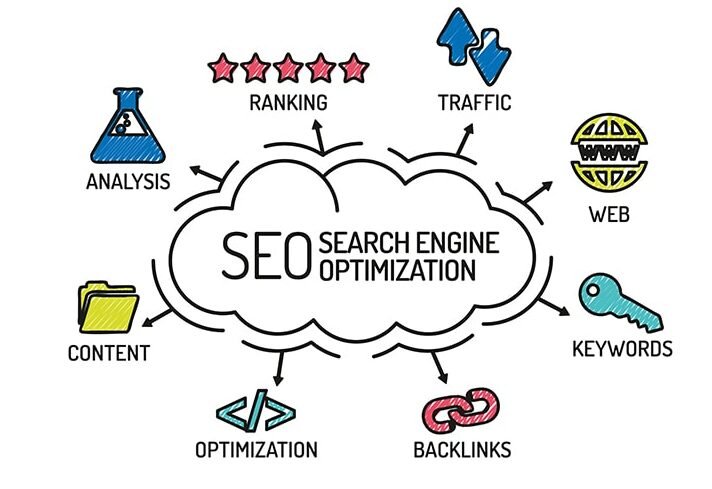- SEMRush is a popular tool that provides users with a range of features for optimizing their websites for better visibility on search engines. It offers powerful tracking capabilities for monitoring changes in SERPs.
- Surfer SEO helps you optimize your website for maximum visibility. It offers comprehensive keyword research capabilities as well as page optimization features like a content editor, site structure analyzer, and more.
- It is an SEO powerhouse and one of the most popular tools in the industry. It offers a wide array of features like full-fledged keyword research, backlink analysis, content audit, and more.
Finding the right SEO tools can feel like a big task, especially if you’re just starting.
I’ve been there—trying to figure out how to get more people to visit my website without feeling completely lost.
The good news? Some tools can make things a lot easier. From helping you find the right keywords to tracking your website’s performance, SEO tools save time and give you clear insights.
In this list, I’ll share the best SEO tools that are simple to use and deliver great results. Whether you’re running a small blog or managing a business website, there’s something here for everyone. Let’s dive in!
25+ Best SEO Tools 2024: What Works Best?
1. SEMRush:
SEMRush is a popular tool for optimizing websites for better search engine visibility. It provides users with a range of features.
Its comprehensive keyword research capabilities allow users to easily discover profitable keywords and craft effective strategies to increase their rankings.
Additionally, it offers powerful tracking capabilities for monitoring changes in SERPs over time.
Pros
- It can do Google rank tracking
- It is provided with the SEMRush sensor
- It is one of the best content explorers
- It can perform site audits
- It has powerful domain authority tracking
- It is the gold standard in keyword research tools
Cons
- Sometimes, it is ranked low in user interface and accessibility
- Position tracking is difficult with SEMRush
2. Surfer SEO:
Surfer SEO helps you optimize your website for maximum visibility. It offers comprehensive keyword research capabilities as well as page optimization features like a content editor, site structure analyzer, and more.
In addition to this, it can be used to monitor backlinks, check SERP results, and compare a website’s performance with that of competitors.
Pros
- Useful for important landing pages
- Easy to use and effective
- Very intuitive and great easy navigation
- Content creation is a breeze
- Competitive data is unprecedented
Cons
- Difficult to implement a new text
3. Ahrefs:
It is an SEO powerhouse and one of the most popular tools in the industry. It offers a wide array of features, such as full-fledged keyword research, backlink analysis, content audit, and more.
With these tools, users can craft powerful strategies to increase their rankings on search engine results pages (SERPs).
Additionally, it has competitive research capabilities that allow you to analyze your rivals’ activities and determine what works for them.
Pros
- It has a huge database
- Depth analysis and research
- Recently added organic keyword
- Very effective in keyword research
Cons
- Traffic is not always accurate
4. Google Search Console:
It is a free tool offered by Google that allows users to track their website’s search engine performance. It provides features like keyword research, link building, content optimization, and more.
Additionally, it offers insights into competitors’ activities, which can be used to craft effective strategies for increasing traffic and boosting conversions.
Pros
- Extremely relevant data collection
- Very nice HTML improvisation
- Effective mobile usability
- Sitemaps and site messages
- Crawl and fetch as google
Cons
- Hard to recrawl URLs
- Hard to follow data during analysis
5. Moz:
It is an SEO tool that provides users with a suite of features for optimizing their websites for better visibility on search engines.
With its comprehensive set of tools, users can easily uncover profitable keywords and optimize their content accordingly.
Additionally, it has powerful competitor analysis capabilities, which can be used to monitor changes in rankings over time.
Pros
- Improve SEO rankings
- Identity website issues
- Link building opportunities
- Understand site visitor behaviors
Cons
- Lots of features to manage
- Very expensive
6. Ubersuggest:
Ubersuggest is a great SEO tool designed specifically for keyword research. With its comprehensive set of features, users can easily uncover profitable keywords that will help them boost their ranking on search engine results pages (SERPs).
Furthermore, it offers insights into competitors’ activities to help users craft effective strategies for increasing traffic and boosting conversions.
Pros
- It runs very fast
- Generates new keyword ideas
- Easily accessible by anyone
- It has a word cloud to visualize keywords
- Very much language flexibility
Cons
- Limitations on the target market
- It is a little bit lacking
7. Advanced Web Ranking:
It is an advanced SEO toolkit that helps users craft effective strategies to get more traffic and boost conversions. It provides features like keyword research, link building, content optimization, and more.
Additionally, it has a comprehensive set of tools for competitor analysis and SERP tracking, which can be used to monitor search engine rankings over time.
Pros
- Best customer service team
- Best in gaining real value in ranking
- Very cost-effective in price
- Easy to use and accessible
Cons
- Inability to schedule ranking
- Sometimes time-consuming
8. SE Ranking:
It is another great SEO tool designed to help users improve their website performance by providing them with insights into how their competitors are performing on search engines.
It offers a wide range of features, such as keyword research, link building, content optimization, and more. Moreover, it includes automated reports for tracking progress over time.
Pros
- It has tons of features
- Improves SEO performances with suggestions
- It has page grade
- Effective task management
- Good backlink management
Cons
- A limited number of user seats
9. Authority Labs:
Authority Labs is a powerful SEO platform designed to help users optimize their websites for better search engine visibility.
It provides features like keyword research, site structure analysis, content optimization, and more. It also offers in-depth insights into competitors’ activity and the ability to track changes in SERPs over time.
Pros
- The interface and UI are fantastic
- Data quality was very high
- Check ranking for multiple keywords
- Stronger technical backend
- Results are very accurate
Cons
- Expensive compared to others
- Some words are not found
10. Sitechecker:
Sitechecker is an SEO tool that helps users improve their website visibility by providing them with a suite of features such as keyword research, link building, content optimization, and more.
Additionally, it offers insights into competitors’ activities to help users craft effective strategies for getting more traffic and boosting conversions.
Pros
- It is cool and easy to use
- Improves website rating and classification
- Helps to monitor and improve the ranking
- Easy to export and useful for diagnosing
- Audits are in-depth
Cons
- Not providing good solutions to the problem
- Struggle on the sales side
11. Serpstat:
Serpstat is an excellent SEO tool that provides a comprehensive range of features such as keyword research, link building, content optimization, and more.
It also offers users insights into their competitors’ activities to help them create effective strategies for generating more traffic and increasing conversions.
Additionally, it includes automated reports for monitoring progress over time.
Pros
- Audit reports are nice
- The user interface is easy to navigate
- Domain analysis is great for creating a baseline
- Generous rank tracking limits
- Solid keyword research functionality
Cons
- Kind of expensive
- Not many websites have backlinks
12. Long Tail Pro:
Long Tail Pro is an SEO tool that specializes in keyword research.
It provides users with a comprehensive set of features that enables them to identify profitable keywords that can improve their search engine results page (SERP) rankings.
Additionally, it offers competitor analysis capabilities, allowing users to track changes in rankings over time.
Pros
- More specific and highly targeted than short tail keyword
- This can lead to higher conversion rates
- Can help new or low authority pages Rank quickly
- Easy to use and accessible
Cons
- It is less competitive
- Somewhat expensive
13. SEObility:
SEObility is a great SEO tool that helps users optimize their websites for better visibility across multiple search engines.
It offers various features such as keyword research, site structure analysis, content optimization, and more.
Moreover, it provides a comprehensive set of tools for competitor analysis and SERP tracking, which enables users to monitor changes in search engine rankings over time.
Pros
- Like the visual elements in the audit
- Audit tools go very deep, covering tech and meta
- Gives detailed information about the website
- It is a straightforward UI
Cons
- Expensive than the other
- Sometimes, it is not accurate to measure rankings
14. SEOquake:
SEOquake is a tool designed to help users enhance their website’s performance by providing insights into how their competitors are performing on search engines.
It offers various features such as keyword research, link building, content optimization, and more.
Moreover, it generates automated reports to track progress over time.
Pros
- Good traffic information
- Getting display ad information
- Checking SERP results from different locales
- It is free for the first 100 pages of the audit
- Helps to improve the infrastructure of the website
Cons
- It doesn’t have an exciting design.
15. SEOptimizer:
SEOptimizer is a well-known tool that offers a variety of features to help users optimize their websites for better search engine visibility.
Its comprehensive keyword research capabilities make it easy for users to find profitable keywords to target in order to improve their rankings.
Additionally, it includes tools for competitor analysis, which can be used to track changes in SERPs over time.
Pros
- Not doing any spam activities
- Making the website technically sound
- Relevant and useful content on the website
- Optimizing the load time of the website
Cons
- It is expensive
- Results are not guaranteed
16. LinkMiner:
LinkMiner is an exceptional tool for SEO, specifically designed for link-building purposes.
It offers a comprehensive set of features that enable users to discover profitable backlinks easily and create effective strategies for generating more traffic and increasing conversions.
Furthermore, the tool provides valuable insights into competitors’ activities, enabling users to stay ahead of the competition.
Pros
- Very much user-friendly
- Color-coded link strength scores for quick evaluation
- Includes a report for new and old backlinks
- Includes most important backlinks
- Can save selected backlinks
Cons
- Does not include metrics for the domain.
17. Pitchbox:
Pitchbox is a complete SEO solution that aids users in improving their website’s visibility on multiple search engines.
It offers various features, including keyword research, link building, content optimization, and more.
Additionally, it has a wide range of tools for competitor analysis and SERP tracking, which can be used to monitor changes in search engine rankings over time.
Pros
- Email accounting is awesome
- Prospecting is fantastic
- Chasebox is really good
- Great customizing email outreach
Cons
- Downtime of software is high
18. Mangools:
Mangools is an all-in-one SEO tool that helps users optimize their websites for better visibility on search engines.
It offers a comprehensive set of features that enable users to identify profitable keywords and optimize their content accordingly.
Additionally, Mangools has powerful SERP tracking capabilities, which can be used to monitor changes in rankings over time.
These are among the best SEO tools available today. Each has unique features and capabilities that make it ideal for any website owner who wants to improve their website’s ranking on search engine results pages.
Pros
- Affordable in price
- Provides five most crucial tools of SEO Marketing
- Self-assessment is easy and fast
- Runs SEO campaigns successfully
- Easy to install
Cons
- Not have a direct phone call line
- Only available for Google and Mozilla.
19. SpyFu:
SpyFu is a widely used tool that offers a variety of features to help website owners increase their visibility across several search engines.
It includes useful features such as keyword research, link building, content optimization, and more.
One of its key strengths is its ability to analyze competitors, allowing users to track changes in search engine results over time.
Pros
- Historic traffic
- Easy keyword tracking
- Effective PPC research
- Easy presentable report
Cons
- The very weak keyword database
- Expensive to use.
20. WooRank:
WooRank is an all-in-one SEO tool designed to help users optimize their websites for better visibility on search engines.
Its features include keyword research, link building, content optimization, and more.
The tool also provides a comprehensive set of features for competitor analysis and SERP tracking, which can be used to monitor changes in search engine rankings over time.
Pros
- Effective SERP ranking tracking
- Impressive task management
- Provide in-depth insight
- Helps to rank websites in Google
- Very much user-friendly
Cons
- The Premium version has more options
21. Fat Rank:
Fat Rank is an SEO tool that focuses on link building.
Its rich set of features allows users to identify valuable backlinks, create effective strategies to drive traffic, and increase conversions.
Moreover, the tool provides insights into competitors’ actions, helping users stay ahead in the market.
Pros
- Provides lead generation service
- Effective video representative
- Support and guidance for thinking
- Provides link building
Cons
- Expensive than other software
- Not much user-friendly
22. SiteLiner:
SiteLiner is an excellent tool that offers a variety of features to help users optimize their websites for better visibility across multiple search engines.
It comes with features such as keyword research, link building, content optimization, and more. It also has powerful competitor analysis capabilities that can be used to monitor changes in rankings over time.
Pros
- Very much user-friendly
- Improves ranking of the site
- Affordable in use
- It provides fast analysis
Cons
- Limited free options
- Limited competitive analysis metrics.
23. Screaming Frog SEO Spider:
The Screaming Frog SEO Spider is a tool offered by Screaming Frog that enables users to monitor their website’s performance on search engines.
It provides a range of features, including keyword research, link building, content optimization, and more.
Additionally, it offers competitor analysis tools that can be used to track changes in SERPs over time.
Pros
- It can find missing title tags
- Generate XML sitemaps
- Schedule audits
- It can find broken links
- Quickly extracts valuable insights about each page
Cons
- Data export is clunky
- Expensive to use
24. Scalenut:
Scalenut is an SEO tool that helps users optimize their websites for better visibility across multiple search engines.
It offers a comprehensive suite of features like keyword research, link building, content optimization, and more.
Scalenut also provides insights into competitors’ strategies and allows users to track their website’s performance over time.
Pros
- It has a simple and clean UI.
- Very easy to use
- It has lots of features
- It has a great community
Cons
- Not able to customize framework and template
25. GrowthBar:
GrowthBar is a tool that helps users optimize their SEO efforts.
It provides a range of features, including link building, keyword research, content optimization, and more. Additionally, GrowthBar comes equipped with advanced tools such as Anchor Text Analysis, Competitor Analysis, and SERP Tracker.
These tools allow users to monitor changes in search engine rankings and track progress over time with automated reports.
Pros
- Has a simplistic interface
- Offers a 5-day free trial
- Offers a chrome extension
- Great customer support
- Comprehensive research tools
Cons
- The monthly subscription is expensive
- Cannot build broken links
26. KW Finder:
KW Finder is an effective keyword research tool that helps you find the most relevant and profitable keywords for your business.
It provides accurate data on search volume, as well as other important metrics like cost-per-click (CPC) and competition level, which can help you make informed decisions about which keywords to target.
Additionally, KW Finder also provides a Keyword Difficulty score that helps you assess how difficult it might be to rank for particular keywords in search engine result pages (SERPs).
Pros
- Good keyword organization
- Localized keywords too
- Keyword Suggestions
- UI is easy to navigate
- It is really quick
Cons
- More chat support
27. Answer The Public:
Answer The Public is an SEO tool that provides valuable insights into the questions people ask related to particular topics.
It collects questions from popular search engines like Google and Bing, giving you access to the exact phrases people use when searching for information on a particular topic.
This is extremely helpful for finding keyword ideas that are more likely to receive higher search volume and for crafting content that is better targeted to your audience’s needs.
Pros
- It has question features
- With the data view, you can see the data.
- Provides visualization view
- Alphabetical options allow you to see keywords
- Easy to use
Cons
- Expensive and time-consuming
28. Majestic:
Majestic is a tool that offers a detailed analysis of backlinks.
It enables you to examine any website’s link profiles and determine which domains are directing traffic to it.
You can leverage Majestic to gain an understanding of your competitors’ link-building strategies and identify opportunities to create links that will enhance your own site’s rankings.
Pros
- Organic traffic insights
- Provides backlink support
- Competitor analysis
- Very strong onsite analysis
- Keyword checker is useful
Cons
- Excludes business profile
29. Keywords Everywhere:
“Keywords Everywhere” is a browser extension available for Chrome and Firefox. It displays estimated search volumes and cost-per-click (CPC) data on popular websites like Google Search Console, Google Ads, YouTube, and more.
This makes it easier for users to identify valuable keywords without having to switch between multiple tools.
The extension can help users quickly find profitable search terms that are relevant to their industry.
Pros
- Useful for digital marketers
- Easy to use and accessible
- It is very quick
- Localized keywords too
Cons
- Very time-consuming and expensive
What Is the Best Free SEO Tool?
There are a lot of free SEO tools out there, but they don’t have as many useful features as paid tools. But if you want to check on your SEO and research keywords for free, you can use one of these tools:
1. Google Keyword Planner.
2. Moz Link Explorer.
3. Google Trends.
4. Google Analytics (GA).
5. Search Console for Google.
6. Keyword Hero.
7. The Screaming Frog
How Do SEO Tools Work?
SEO tools are software applications used by website owners to enhance their website’s visibility on Google. These tools assist in keyword research, link building, on-page SEO, keyword ranking tracking, technical SEO, and more.
Most SEO tools are available as software-as-a-service (SaaS) applications, which can be accessed online for a monthly fee.
Since Google’s algorithm is continually evolving, it’s important to have a range of SEO tools that can be used for various tasks.
For instance, if you’re starting a new website, you can employ Ahrefs for keyword research, SurferSEO for semantic keywords and on-page SEO, and SEMrush for technical SEO analysis.
Importance of Quality Content and Relevant Links In SEO:
The bread and butter of SEO is content. If you don’t have quality content, you won’t rank high in search results. This is due to the fact that your website must be relevant to what people are looking for.
You can have the best website in the world, but if no one searches for what you have to offer, you will not rank.
This is why keyword research is essential. You must research what people are looking for and generate content around those keywords.
You need high-quality backlinks in addition to amazing content. Backlinks are links to your website from other websites. Backlinks are used by Google to determine the quality of your website.
The higher your ranking in search results, the more high-quality backlinks you have. This is why link building is such an important component of SEO. You must actively seek out high-quality websites to connect to yours.
There are numerous strategies for accomplishing this, but some of the most common are guest blogging, broken link construction, and the skyscraper methodology.
All of these duties can be aided by the use of the correct SEO tools. They may assist you with keyword research, SERP analysis, rank tracking, and link tracking, among other things.
What Exactly is E-A-T in SEO?
E-A-T in SEO: Expertise, Authoritativeness, Trustworthiness
E-A-T stands for “Expertise, Authoritativeness, and Trustworthiness,” and it is a concept introduced by Google in its Search Quality Evaluator Guidelines. E-A-T is a set of criteria used by Google’s human evaluators to assess the quality of web pages and how well they meet user intent.
While E-A-T is not a direct ranking factor, it indirectly influences search engine rankings by emphasizing the importance of high-quality, trustworthy content.
Here’s a breakdown of each component of E-A-T:
1. Expertise (E):
This refers to the level of knowledge and skill demonstrated by the content creator or the website.
Expertise establishes the author’s authority on a specific topic. Content that showcases expertise is more likely to be considered valuable and reliable.
2. Authoritativeness (A):
Authoritativeness assesses the reputation and influence of the content creator, the website, or the brand.
High-authority sources are more likely to be seen as credible and reliable. Backlinks from authoritative sources can also contribute to a website’s overall authority.
3. Trustworthiness (T):
Trustworthiness involves the reliability and credibility of the information provided. Users should feel confident that the content is accurate, unbiased, and based on reputable sources.
Elements such as a clear privacy policy, secure website connection (HTTPS), and transparent information contribute to trustworthiness.
FAQs
🚀 What are SEO tools, and why are they important?
SEO tools are software applications designed to assist in optimizing websites for search engines. They play a crucial role in enhancing online visibility and improving search engine rankings.
📊 How do SEO tools help with keyword research?
SEO tools analyze search trends and provide insights on relevant keywords, including search volumes and competition levels.
📈 How do SEO tools contribute to rank tracking?
Rank tracking tools monitor a website's performance in search engine results, delivering real-time information on keyword rankings.
🤔 What role do backlink analysis tools play in SEO?
Backlink analysis tools assess a website's backlink profile, evaluating factors like source authority and link quality to determine overall trustworthiness.
🤨 How do SEO tools guide content optimization?
SEO tools offer insights into keyword usage, content length, and readability, guiding the creation of optimized and engaging content.
Quick Links:
- Black Hat SEO Tools: How To Use This Black Hat SEO Technique? Top Black Hat Tools
- Best WordPress SEO Tools: Plugins With Reviews[Latest]
- The Ultimate Guide To Bing Webmaster Tools For SEO
- What Does ChatGPT Do? ChatGPT For Content And SEO?
Conclusion: Best SEO Tools 2024
With the right combination of Best SEO tools, you can easily increase your website’s visibility and boost its performance.
Boost your website’s visibility and achieve digital success with these top optimization tools. Discover the key to standing out in the digital crowd and beating the competition!
So don’t wait any longer – start optimizing your website today!
Quick Links:





